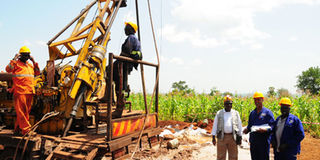Review of mining laws begins

Ministry of Energy Permanent Secretary Fred Kabagambe Kaliisa (3rd L) on a fact finding mission at Karuma Hill Exploration Area in Kiryandongo District where new mineral traces were recently discovered. PHOTO BY Stephen Wandera.
What you need to know:
Move meant to eliminate clauses which render investment in the sector ‘unattractive’.
Kampala
In an attempt to boost investment in the mining sector, the Ministry of Energy and Mineral Development has started a review of mining laws governing the industry.
The existing laws are the Mineral Policy, which was established in 2001, the Mining Act 2003 and the attendant regulations established in 2004. According to the ministry, the move is meant to modify or get rid of clauses in the law book that renders investment in the mineral industry unattractive.
In a press statement issued by the ministry last week, the process of revising the mining laws is informed by the desire to attract high worth capital to establish a modern and viable mining industry.
The decision to review the Mineral Policy and Mining Laws was reached at during a three-day workshop attended by industry experts, donors and government held between July 16 and 18 in Kampala.
Need to attract, protect investors
Speaking at the workshop, Mr Fred Kabagambe-Kaliisa, the Permanent Secretary of the Ministry of Energy and Mineral Development, said there is need to attract and protect industry investors if they are to continue investing in exploration and development of the sector.
He said: “Based on the implication of the recent global financial crisis, for Uganda to sustain the attraction of this scarce and mobile international capital, it is imperative to review the current legal regime that shall be able to attract and respond to the demands of the foreign investor.”
He continued: “It is for this reason that this review will not only focused on the provisions of the Mining Act 2003 but also the land laws, and tax laws in Uganda that directly impact on the development of the country’s mineral sector.”
The acting Commissioner, Department of Geological Survey and Mines, Mr Edwards Katto, said unlike the current Minerals Policy, the review will ensure that issues around incentives are clearly spelt out.
At the moment issues to do with incentives for investment in value addition and on the use of mineral rights to act as a guarantee to mobilise funding through local and international stock market, has been passively tackled.
Mr Katto said: “Lack of clearly spelt out incentives is considered a disincentive. This is more so to mainly the mineral rights holders who could have done commendable work but because of lack of sufficient capital to develop the reserves, they end up being categorised as non-performers.”
World bank advises government on ‘attractive’ legal framework
World Bank mineral law consultant Bryan Land also said the country should embrace what he described as well established principles of what makes a legal framework attractive to investors. According to him, clarity, predictability, security of tenure, access to legal recourse and a level playing field are crucial in attracting serious investors. “Legislative frameworks can be relied upon to satisfy both investor and government interest without needing a mining agreement,” he said.
Dr Naima Hasci, the World Bank senior advisor, quoted in a statement issued by the Ministry, said: “The new mining laws should focus on mainstreaming the small scale miners, management of environmental and social impacts and community engagement.




